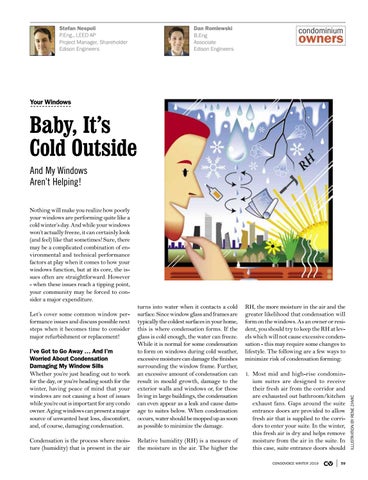Stefan Nespoli P.Eng., LEED AP Project Manager, Shareholder Edison Engineers
Dan Romlewski B.Eng Associate Edison Engineers
condominium
owners
Your Windows
Baby, It’s Cold Outside And My Windows Aren’t Helping! Nothing will make you realize how poorly your windows are performing quite like a cold winter’s day. And while your windows won’t actually freeze, it can certainly look (and feel) like that sometimes! Sure, there may be a complicated combination of environmental and technical performance factors at play when it comes to how your windows function, but at its core, the issues often are straightforward. However - when these issues reach a tipping point, your community may be forced to consider a major expenditure.
Condensation is the process where moisture (humidity) that is present in the air
Relative humidity (RH) is a measure of the moisture in the air. The higher the
RH, the more moisture in the air and the greater likelihood that condensation will form on the windows. As an owner or resident, you should try to keep the RH at levels which will not cause excessive condensation - this may require some changes to lifestyle. The following are a few ways to minimize risk of condensation forming: 1. Most mid and high-rise condominium suites are designed to receive their fresh air from the corridor and are exhausted out bathroom/kitchen exhaust fans. Gaps around the suite entrance doors are provided to allow fresh air that is supplied to the corridors to enter your suite. In the winter, this fresh air is dry and helps remove moisture from the air in the suite. In this case, suite entrance doors should CONDOVOICE WINTER 2019
CV
59
ILLUSTRATION BY RENE ZAMIC
I’ve Got to Go Away … And I’m Worried About Condensation Damaging My Window Sills Whether you’re just heading out to work for the day, or you’re heading south for the winter, having peace of mind that your windows are not causing a host of issues while you’re out is important for any condo owner. Aging windows can present a major source of unwanted heat loss, discomfort, and, of course, damaging condensation.
turns into water when it contacts a cold surface. Since window glass and frames are typically the coldest surfaces in your home, this is where condensation forms. If the glass is cold enough, the water can freeze. While it is normal for some condensation to form on windows during cold weather, excessive moisture can damage the finishes surrounding the window frame. Further, an excessive amount of condensation can result in mould growth, damage to the exterior walls and windows or, for those living in large buildings, the condensation can even appear as a leak and cause damage to suites below. When condensation occurs, water should be mopped up as soon as possible to minimize the damage.
Let’s cover some common window performance issues and discuss possible next steps when it becomes time to consider major refurbishment or replacement!
